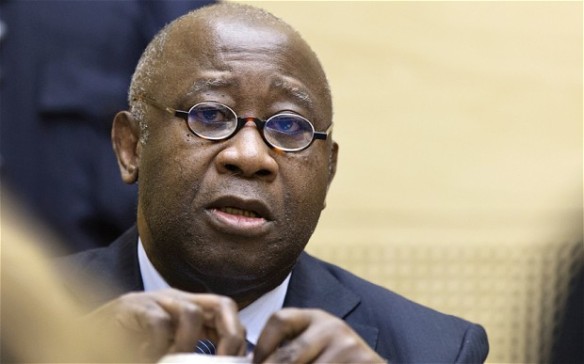By Stephen Smith Cody and Robin Mejia
Stephen Smith Cody directs the Atrocity Response Program at the University of California, Berkeley’s Human Rights Center, where he designs and manages research related to human rights violations in the Central African Republic, Democratic Republic of the Congo, Kenya, Sudan, and Uganda. Stephen holds a PhD in sociology and JD, both from Berkeley. You can follow him here. Robin Mejia is a journalist and researcher whose work has appeared in the Los Angeles Times, The Washington Post Magazine, Wired, Nature, Mother Jones and many other outlets. Currently, she is pursing a PhD in biostatistics at UC Berkeley and working as a researcher for the Human Rights Center at UC Berkeley School of Law.
This is cross-posted from The Huffington Post.

A protected witness testifies at the International Criminal Court. Source: Reporting Kenya
Witnesses who testify at the International Criminal Court (ICC) against accused war criminals often take great risks to do so. Yet, until now, their voices have been missing from discussions about how the ICC is fulfilling its responsibility to prepare and protect those who testify.
The Human Rights Center at UC Berkeley School of Law has just released “Bearing Witness at the International Criminal Court,” the first empirical study to document the perspectives of ICC witnesses, many of whom survived heinous violations of human rights. The study surveys more than 100 witnesses from the first two ICC cases, those against Congolese warlords Thomas Lubanga Dyilo and Germain Katanga.
From the ICC’s inception, the Court has set out to serve and protect witnesses who may be survivors of conflict-related sexual violence, genocide, war crimes, or crimes against humanity. Yet this past year has brought allegations of sexual assault committed by ICC staff in the Democratic Republic of Congo and reports of government intimidation of potential witnesses in the cases against sitting Kenyan President Uhuru Kenyatta and Deputy President William Ruto for crimes against humanity.
Scholars and advocates have debated how best to prepare and protect witnesses who testify — basing strategies mostly on anecdotal evidence. Now we have data.
These data show that despite the burden of traveling long distances, often from central Africa to The Hague, to testify, and waiting days or weeks without family or friends before confronting hostile lawyers and the accused, most witnesses reported positive experiences with the Court.
Asked to describe their overall feelings about participating in the trials on a scale of 1 to 5 (least to most positive), women reported an average rating of 4.6, and men 4.4. Fully 96 percent of women and 93 percent of men said they were glad that they had agreed to testify, and most said that they would be willing to serve as a witness again.
“I felt like I was letting go of something I’d been holding on to,” said one witness.
Another explained, “I want to fight against impunity. I want justice to be done.”
Witnesses expressed a duty to testify to ensure an acknowledgement of the killing of loved ones, neighbors, and colleagues.
“I felt naked, very exposed, vulnerable,” said one witness interviewed for the study. “I felt a very heavy responsibility having to take part in the process of justice.”
Although most witnesses had no previous court experience at home or abroad, they reported that pretrial orientations and support services helped assuage their anxieties.
“All the information, preparation, and advice I received helped me a lot,” said one witness. “This made it easier for me during my testimony period.”
Witnesses reported feeling safe during their preparation for trial as well as afterward, with women feeling slightly more secure than men.
However, the findings also reveal ongoing concerns about being identified and targeted. Most women and men reported using some form of identity protection at trial. And many survey participants expressed fear about potential repercussions following trial. “Now, after my testimony, I will have a bigger need for protection,” said one witness.
The study also shows some divides in the ways that men and women experience trials. Women, on average, viewed their interactions with the ICC more positively. Yet only 60 percent of women believed that their testimony helped establish the truth, as compared with more than 70 percent of men.
Also, somewhat surprisingly, only a quarter of witnesses in the study were women, and they provided almost all the testimony on sexual violence. Understanding why women participate in trials at lower rates than men and whether they are being used disproportionately to testify about sexual violence are key issues for the court to address.
Additionally, more data are needed to understand what happens to witnesses when they return home. The Court has developed a survey that is intended to be offered six months after a witness lands back in his or her home country; however, due to logistical, safety and financial constraints, fewer than half of eligible witnesses had been approached to take the survey. Therefore, we can say little at this point about the long-term impact of testifying in international criminal cases.
Protecting witnesses can be challenging and expensive, especially in the long term, and the ICC’s commitment to witnesses after they have appeared at trial is critical.
“Now that I have completed my testimony, I hope the ICC does not abandon us,” said one witness, articulating a looming issue for the ICC and all who care about international justice.
In spite of the limitations of the survey and uncertainty of long-term witness protection, the Human Rights Center’s study suggests that when done right, testifying at international criminal trials can be a safe and even empowering experience.










